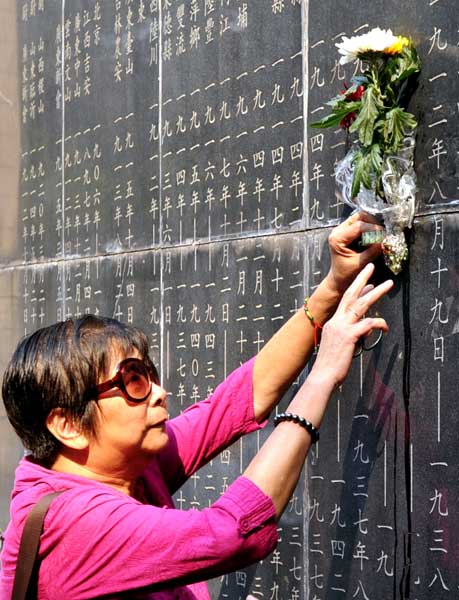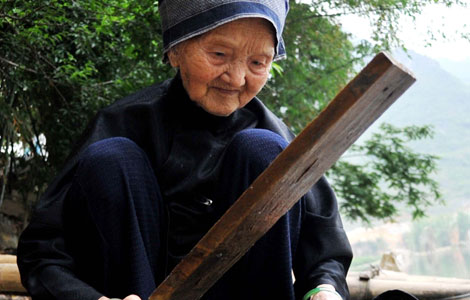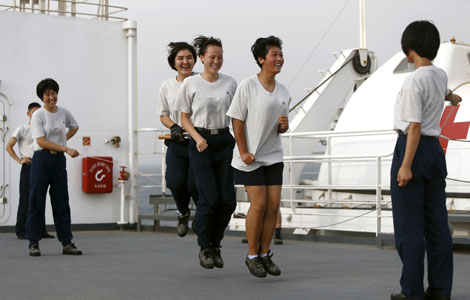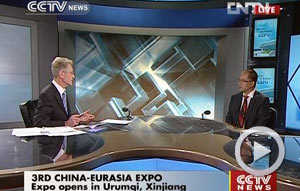Attempts to ignore history will be opposed
Updated: 2013-09-04 02:17
By Zhang Yunbi (China Dail)
|
||||||||
Beijing makes rare statement on anniversary of war victory
Any attempts to whitewash the history of Japanese aggression will be firmly opposed and rejected by everyone in the Asian neighbors it victimized and the international community, a Foreign Ministry spokesman said on Tuesday.
Qin Gang made the remarks in a written statement released on the 68th anniversary of the Chinese people's victory in the War of Resistance against Japanese Aggression (1937-45).
 |
|
A Nanjing resident places flowers at a war memorial on Tuesday to mark the 68th anniversary of the Chinese people's victory in the War of Resistance against Japanese Aggression in 1945. Lang Congliu / For China Daily |
"Only by remembering that period of history and learning lessons from it can we ensure that the historic tragedy will not be repeated," he said.
Observers said a statement from the ministry on the anniversary is rare. They said the ministry made the statement as a warning against Japan's strategy of removing postwar constitutional bans on a military buildup and the amnesia of some prominent political figures regarding that country's militaristic past.
Gao Haikuan, vice-president of the China Society of the History of Sino-Japanese Relations, said the right-wing mood is now "an issue" that is spreading within Japanese politics.
"It does not simply exist in a small number of Japanese politicians. The entire Japanese political arena is shifting to the right," Gao Haikuan warned.
After assuming office in December, Japanese Prime Minister Shinzo Abe has been challenging the postwar international order.
In March, Abe said at a Japanese Parliamentary hearing that the ruling of the International Military Tribunal for the Far East "was made by those who won World War II", local media reported.
The hawkish Japanese leader also said that "history should be assessed by historians".
Qin said in the Foreign Minstry's statement on Tuesday that the Chinese people made a great contribution to the victory, and "China deeply cherishes the memory of fellow victims" who lost their lives in the war against fascism.
Chinese citizens from all walks of life paid tribute to the war dead in memorial museums around China on Tuesday, including Beijing's Museum of the War of Chinese People's Resistance Against Japanese Aggression.
Beijing urged Tokyo to "take a responsible attitude toward the history and future, sincerely implement its positions and commitments for reflecting on its aggressive past, and win trust from its Asian neighbors and the international community with its tangible efforts", Qin said.
The Sino-Japanese relationship has been rocky since the Japanese government unilaterally announced its "nationalization" of China's Diaoyu Islands in the East China Sea in September 2012.
Wang Xinsheng, a professor of Japanese studies at Peking University, said the latest poll results showed that Japanese and Chinese public sentiment toward each other has dropped to a record low, a situation favorable for spreading a nationalistic mood.
"Under such circumstances, the Japanese Cabinet may take advantage of the public mood to push forward its right-wing policies, including the plan to upgrade Japan's armed forces and seek military operations overseas," Wang said.
Tough posturing against China will help Tokyo "consolidate public opinion and win more attention for its own country", Wang added.
Former Japanese prime minister Tomiichi Murayama had urged Japanese politicians to be clearer about the history of the country's colonial rule and aggression against its Asian neighbors, and cautioned against repeating mistakes.
"I am very worried about the Japanese swing to the political right," Murayama said during an interview with People's Daily published on Monday.
In 1995, in what was called the "Murayama Statement", the former Japanese prime minister admitted that Japan caused tremendous damage and suffering in many countries, particularly in Asia, through colonial rule and aggression.
But this year, Abe broke the decades-long tradition of his predecessors — apologizing to Asian neighbors for the country's militaristic past — at an annual commemorative ceremony regarding Japan's anniversary of its surrender in World War II on Aug 15.
- Abe creates boogeyman to justify buildup
- Japan in danger of losing moral compass
- No excuse for rise of Japan's militarism
- China urges Japan to earn international trust
- Japan takes steps to promote brand
- History is a mirror for Japan
- China welcomes UN chief's Japan comments
- Japan must repent its past crimes

 The first Chinese to reach US Open semi-final
The first Chinese to reach US Open semi-final
 Fewer Chinese students apply to US graduate schools: report
Fewer Chinese students apply to US graduate schools: report
 Technology transfer is a focus
Technology transfer is a focus
 Syrian refugees exceed 2m
Syrian refugees exceed 2m
 Energy partners boost gas supplies
Energy partners boost gas supplies
 San Francisco-Oakland bridge opens
San Francisco-Oakland bridge opens
 Microsoft in $7.2b deal for Nokia handset biz
Microsoft in $7.2b deal for Nokia handset biz
 Syrian refugee numbers swell to 2m: UN
Syrian refugee numbers swell to 2m: UN
Most Viewed
Editor's Picks

|

|

|

|

|

|
Today's Top News
Syria debate 'is about the world's red line': Kerry
Police name attacker who took boy's eyes
Fewer Chinese apply to US graduate schools
Energy partners boost
gas supplies
Japan urged to face history
'Diamond decade' for China, ASEAN
State asset head sacked from post
C-section vs natural birth
US Weekly

|

|





